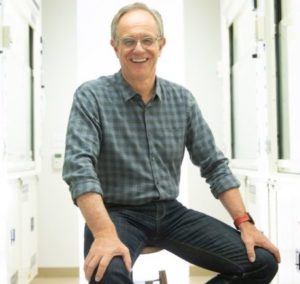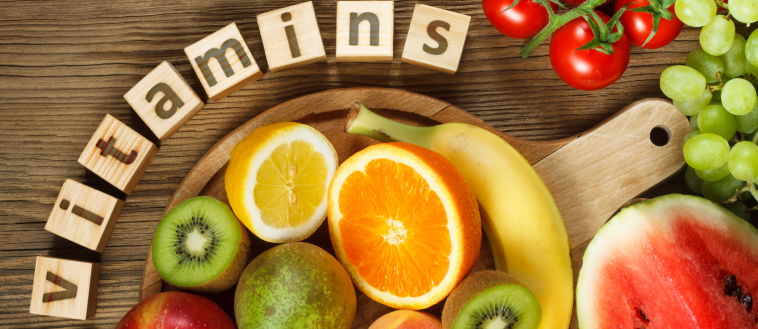by Buck Institute
September 26, 2019 . BLOG
Nature Nurtures: Food is the Best Source for Vitamins
 By Eric Verdin, President and CEO of the Buck Institute
By Eric Verdin, President and CEO of the Buck Institute
I was inspired to write about this topic by an article in Smithsonian Magazine a few months ago. The article summarized findings that have accumulated over time indicating that getting adequate vitamins from your diet is more effective than getting them from taking supplements. Supplements are a hot topic in longevity and aging research, so I wanted to dig in to how the takeaway from the Smithsonian article applies to the aging field.
It’s not surprising that vitamins and supplements loom large in research on aging. Since aging is frequently accompanied by functional decline, it is intuitive to think that increasing essential molecules might ameliorate these declines. In fact, work here at the Buck has shown that Vitamin D can increase the lifespan of C. elegans worms by activating stress response genes and maintaining proteostasis.
Of course, biology is never so straightforward. Anything we consume enters the very complex ecosystem of our bodies and need to find its way from our digestive system into the rest of us. Bioavailability is the amount of a vitamin, mineral, or nutrient absorbed into the body that is actually usable. While a vitamin tablet might contain 100iu, not all of it is fully absorbed or used by the body’s systems. Bioavailability tends to be much higher in foods than supplements, probably because our bodies have millions of years of practice getting nutrients out of foods, and a lot less experience getting them in concentrated form from a pill. Additionally, the quantities of vitamins that we need each day are tiny and often easily consumed in common foods. For example, the recommended amount of vitamin K needed each day is about 100mcg. One serving of kale has around 10x this amount! Research on taking supplements “just in case”, without a documented deficiency, regularly indicates that the thing they are best at is enriching the supplement company. Large-scale epidemiologic data does not support long-term health benefits of vitamin supplements, and “mega-doses” can actually be toxic for the body.
As with most rules, however, there are exceptions so indeed, there are cases in which vitamin supplementation can be important. Older adults are more at risk of vitamin deficiencies, usually because totally calorie input tends to decline in later years. Some vitamins (like B vitamins) are most prevalent in animal protein, so it is commonly recommended that vegetarians and vegans supplement these vitamins. And specific medical conditions sometimes result in vitamin deficiencies. These are particular cases, though, and are easily diagnosed with a simple blood test. Some deficiencies might be fixed by dietary changes, but your doctor might recommend supplements. In this case, the supplements are doing exactly as titled: supplementing a naturally low condition.
And remember: not all supplements are vitamins. Vitamins are only those organic molecules that are essential for normal function but must be consumed in the diet because they cannot be adequately synthesized by the human body. Many supplements (perhaps most) are concentrated forms of other molecules that perform important biological functions. Some of these molecules do seem to naturally decline with age, and it’s possible that supplementation might promote healthspan. NAD+, a molecule studied in my lab (and in many others around the world), is a prime example. It is essential for many fundamental cellular processes and declines with age. In animal models, low NAD+ is associated with accelerated aging and poor health outcomes. Supplementing NAD+, with one of two known precursors, nicotinamide riboside (NR) or nicotinamide mononucleotide (NMN), leads to improved health. Therefore there is a lot of interest, including from me, in the potential of supplementing NAD+ in humans to promote healthy aging. However, for now, this remains just an interest, not a prescription. This is an exciting topic that is developing quickly and I expect to devote an entire blog post to NAD+ soon!
The main takeaway today is two-fold. First, your best bet to ensure adequate levels of essential vitamins is to eat a varied diet that is high in brightly colored fruits and vegetables and lean protein, mostly of plant origin. For most people, supplements are a less efficient way to get what is needed, and more is not necessarily better! Our bodies absorb and use precise quantities to ensure efficient functioning. Flooding your system with too much, or in an unfamiliar form, is not documented to improve body function and might be detrimental. If you want to take a peek into the complexity associated with vitamins, please read this article on the contradictory effect of vitamin E with respect to lung cancer
The second takeaway is the one that makes me sound like a broken record: when it comes to supplements for healthy aging, there is a lot of exciting stuff happening in the lab, but there are still too many unknowns to make blanket recommendations. For now, pay attention to the research reported by independent news sources (not from companies!) to keep abreast of updates, make sure your blood levels are normal, and reach out to your doctor with specific questions.
And, as always, eat your veggies!

SHARE